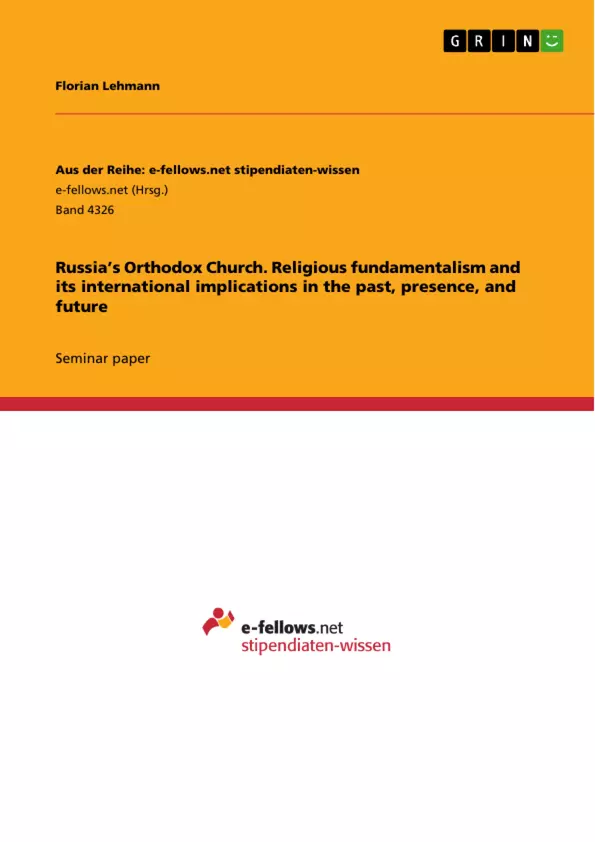The text discusses the role and influence of the Russian Orthodox Church (ROC) in contemporary Russia, particularly since the collapse of the Soviet Union. It highlights the significant increase in the number of Russians identifying with Orthodoxy, which now surpasses two-thirds of the population, reflecting a revival of religious identity and national pride.
Emphasizing the connection between the Russian Orthodox Church and the preservation of Russia's historical greatness, the text explores the church's role in upholding the memory of past achievements, including military victories, literary traditions, space exploration, and the resilience of the Russian people. It notes the high levels of trust in the church and the military compared to other institutions within Russia.
The paper aims to analyze the ROC as a religious fundamentalist group on an international scale. It covers various aspects such as the identification of the ROC as a fundamentalist group, details about its leadership, size, and structure, a historical overview of its development, challenges faced, initiatives taken, and successes achieved in meeting its goals.
Furthermore, the text aims to forecast the future impact of the ROC both locally and globally, considering its media presence and public opinion. It concludes by shedding light on recent events and providing a brief glimpse into potential future developments of the Russian Orthodox Church.
Inhaltsverzeichnis (Table of Contents)
- Introduction
- Religious fundamentalism of the Russian Orthodox Church
- History
- Belief and Ritual
- Successes
- Challenges
- Outlook
Zielsetzung und Themenschwerpunkte (Objectives and Key Themes)
This paper aims to analyze the development of the Russian Orthodox Church (ROC) as a religious fundamentalist group on an international scale. It covers the identification of the ROC as a religious fundamentalist group, its historical origin, religious, political, societal, and geographical development, the challenges and successes it has experienced, its future impact, and its media presence and public opinion.
- The identification of the ROC as a religious fundamentalist group.
- The historical origin and development of the ROC.
- The challenges and successes the ROC has experienced.
- The ROC's future impact both locally and globally.
- The ROC's media presence and public opinion about the religious group.
Zusammenfassung der Kapitel (Chapter Summaries)
- Introduction: This chapter explores the rise of Russian national consciousness rooted in Orthodoxy and examines the role of the Orthodox Church in perpetuating the memory of Russia's historical greatness.
- Religious Fundamentalism of the Russian Orthodox Church: This chapter defines religious fundamentalism and examines the ROC through the lens of Gabriel Almond, R. Scott Appleby, and Emmanuel Sivan's definition. It analyzes the ROC's reactive stance towards modernity, its selective emphasis on modernity, its dualistic thinking, and its absolutist interpretation of scripture or tradition.
Schlüsselwörter (Keywords)
This paper focuses on the Russian Orthodox Church, religious fundamentalism, Russian national identity, Orthodox beliefs, historical development, challenges, successes, future impact, media presence, and public opinion.
- Citar trabajo
- Florian Lehmann (Autor), 2022, Russia’s Orthodox Church. Religious fundamentalism and its international implications in the past, presence, and future, Múnich, GRIN Verlag, https://www.grin.com/document/1430099



